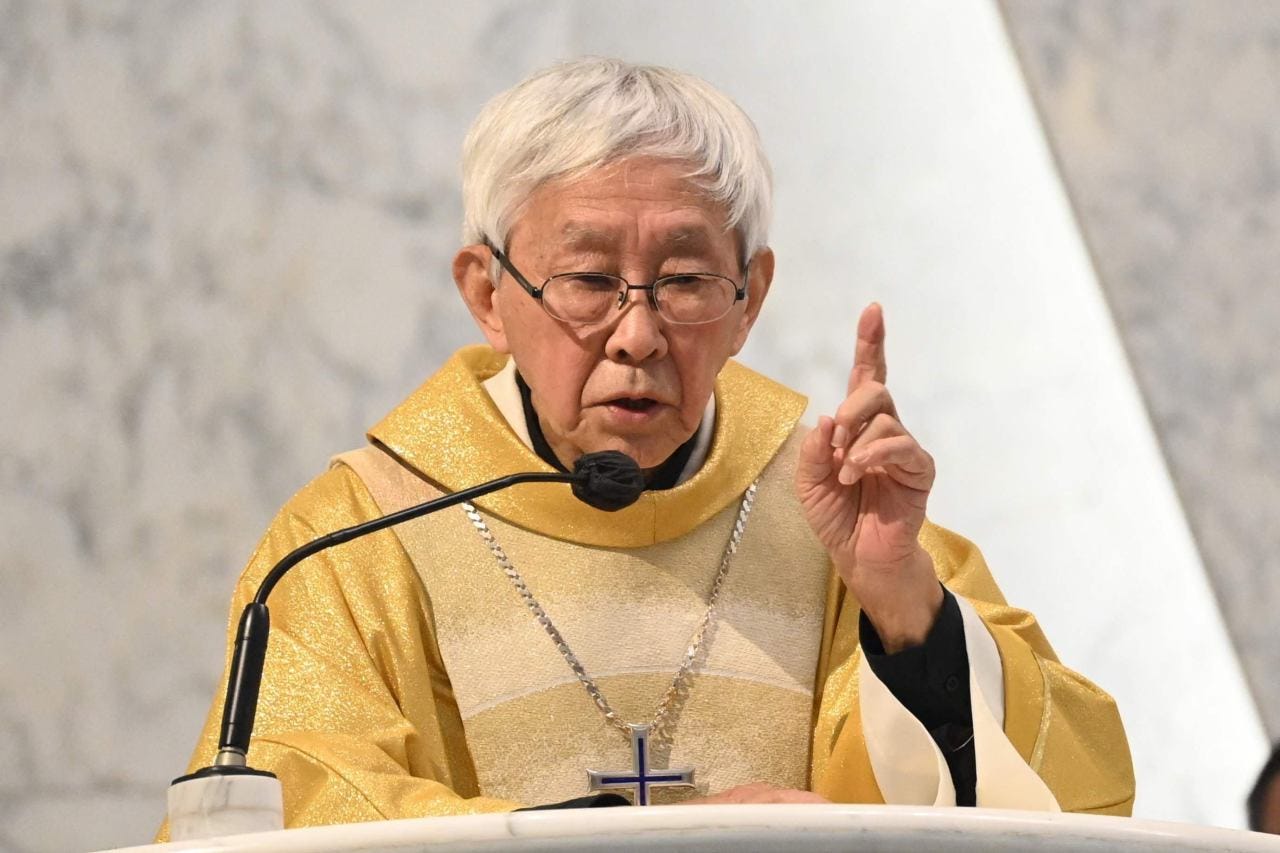Wall Street Journal: Hong Kong’s Dissident Cardinal Zen Should Defect
China’s communists seek to silence his powerful voice for freedom. He can do more good in Rome.
by Father Sirico
Tradition holds that St. Peter, seeing the persecution of Christians under Emperor Nero, left Rome only to encounter Jesus on the road, going the other way. “Domine, quo vadis?” Peter asked—“Lord, where are you going?” Jesus replied, “I am going to Rome to be crucified again.” Peter turned around. His decision ensured his martyrdom.
As Beijing tightens its grip on Hong Kong, the plight of Cardinal Joseph Zen, the city’s 93-year-old bishop emeritus, demands urgent attention. His courageous stand for human rights, religious liberty and democratic values has made him a target of the Chinese Communist Party. Having been permitted to travel to Rome for Pope Francis’ funeral, Cardinal Zen now faces a critical choice: return to Hong Kong, where persecution awaits, or remain in Rome and continue his prophetic witness in safety.
I haven’t consulted Cardinal Zen on this, but as a priest and friend of Hong Kong’s pro-democracy movement, I urge him to stay in Rome. His presence in the Vatican would serve as a powerful rebuke to Beijing’s oppression and a beacon of hope for the faithful.
Born in Shanghai, Cardinal Zen fled communist rule as a young man, eventually rising to become one of Asia’s most prominent Catholic leaders. Ordained in 1961, he served as Hong Kong’s bishop from 2002-09. Pope Benedict XVI made him a cardinal in 2006. In 2022, at 90, he was arrested and tried for his involvement with the 612 Humanitarian Relief Fund, which supported pro-democracy protesters. Convicted and fined, he remains under constant threat of further reprisals. Hong Kong, once a vibrant hub of free expression, is no longer safe for a man of his convictions.
The Vatican is the spiritual and diplomatic heart of the Catholic Church. It offers Cardinal Zen a sanctuary from which he could continue his mission. By staying in Rome, he wouldn’t be retreating but repositioning, amplifying his voice on the global stage. Beijing’s crackdown extends beyond politics to religion. The regime has tightened control over Hong Kong’s Catholic community and pressured clergy to align with the Communist Party’s agenda. Much like Hungarian Cardinal József Mindszenty, who spent years in exile after opposing communist rule, Cardinal Zen could expose these violations. His presence in Rome would force the world to confront the reality of China’s assault on religious freedom. His defection would also signal to Hong Kong’s beleaguered Catholics that their struggle isn’t forgotten.
Cardinal Zen’s critique of the Vatican’s 2018 provisional agreement with China, which he has called a “sellout” of underground Catholics, underscores his role as a conscience for the church. Staying in Rome would allow him to press for a re-evaluation of this secretive deal, which has been renewed three times and emboldened Beijing to intensify its persecution of the church.
The counterargument—that Cardinal Zen’s return to Hong Kong would inspire resilience among his flock—is strong but overlooks the grim reality. His arrest in 2022 and the continuing surveillance he faces demonstrate that Beijing views him as a threat to be neutralized. Returning risks not only his freedom but also the safety of those who associate with him. Beijing’s use of the 2020 National Security Law to silence dissent, as seen in the case of Jimmy Lai, a Catholic media mogul imprisoned for more than 1,500 days, shows the regime’s willingness to crush symbols of resistance.
From the Vatican, Cardinal Zen could rally support for Hong Kong’s pro-democracy movement, engage with global leaders, and inspire Catholics worldwide to pray and act for China’s persecuted faithful. His presence would also challenge the Vatican to adopt a firmer stance against Beijing’s aggression. In the mid-2000s, I witnessed Cardinal Zen’s resolve firsthand when we dined together in Hong Kong alongside Mr. Lai and other defenders of freedom. His clarity and courage left an indelible mark. To lose that voice to a prison cell would be a tragedy for the church and the world.
Some may argue that defection would amount to abandoning Hong Kong’s faithful. Cardinal Zen’s half-century of service—teaching in seminaries, visiting prisoners and baptizing converts like Mr. Lai—refutes any such charge. His decision to stay in Rome wouldn’t be flight but a strategic choice to preserve his ability to fight. The Vatican has the diplomatic weight to protect him, and the new pope, emphasizing dialogue with China, could demonstrate its resolve by offering Cardinal Zen a formal role in Rome, perhaps as an adviser on religious freedom.
The world is watching. Cardinal Zen’s defection would signal that the church won’t bow to tyranny. It would honor the sacrifices of Hong Kong’s pro-democracy activists, from Mr. Lai to the countless unnamed protesters who have faced batons and bars. Most important, it would ensure that Cardinal Zen’s voice—rooted in faith, tempered by suffering, and unwavering in its defense of truth—continues to echo.
I pray that Cardinal Zen chooses Rome, not as a place of exile but as a citadel from which to wage a moral battle for Hong Kong’s soul. The world needs his witness now more than ever.
Father Sirico is president emeritus of the Acton Institute and the former pastor of Sacred Heart of Jesus Parish in Grand Rapids, Mich.
This article was originally published in the Wall Street Journal.



